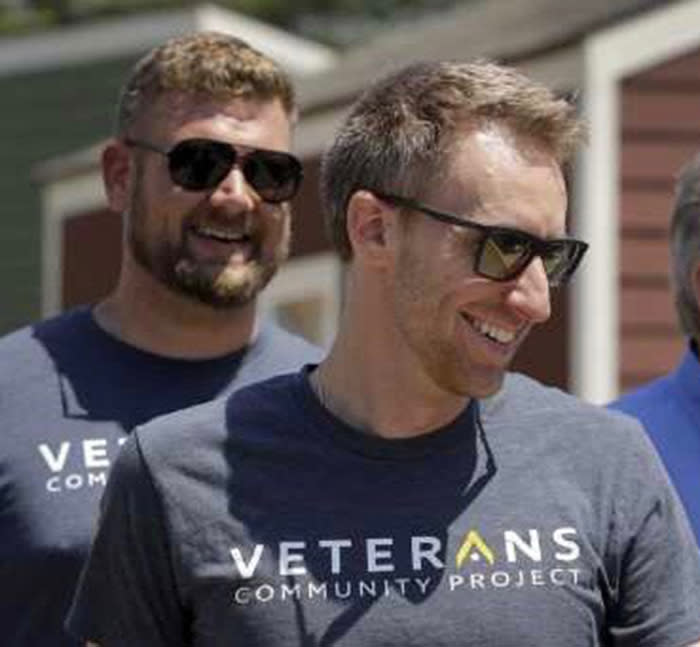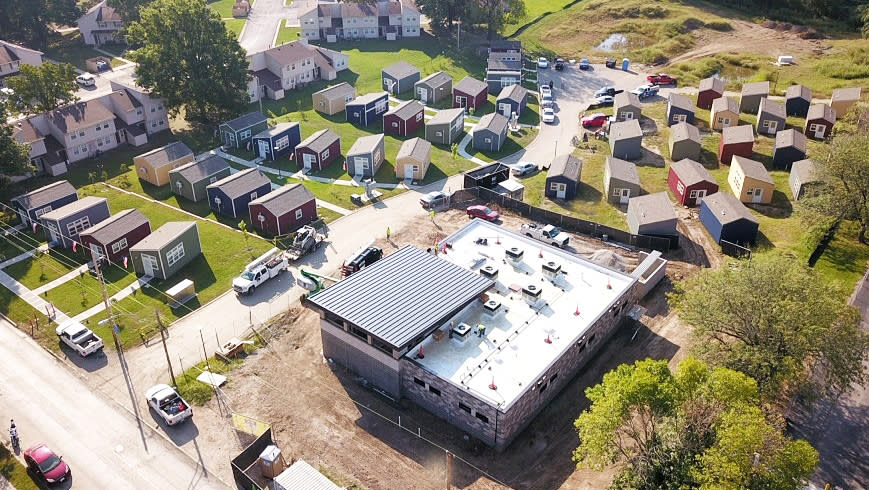This Group's Village of Tiny Homes for Vets 'Saves Lives' While 'Setting Them Up for Success'
Last fall, Jason Kander toured the Veterans Community Project, a Kansas City, Missouri-based non-profit that builds tiny houses for veterans.
“I was amazed by it,” says Kander, former Missouri Secretary of State.
Kander, 38, was a rising political star, and President Barack Obama even said he was the future of the Democratic party. A former Army Intelligence Officer, Kander gained notoriety when his 2016 Senate campaign ad went viral. It showed him assembling a rifle blindfolded while talking about gun control.
Kander was expected to win his Kansas City mayoral campaign, but he made national news last fall when he suspended his campaign to seek treatment for PTSD.
Six weeks after touring the Veteran’s Community Project while campaigning, Kander returned to the non-profit and asked for help navigating the Veterans Administration’s red tape to get treatment.
“There were more obstacles to doing that quickly than I had expected. The process can be a little onerous,” Kander tells PEOPLE. “I ended up being like any of the other 6,000 veterans in Kansas City that this place has helped.”
RELATED: Oregon Woman Turns School Buses Into Tiny Homes for Working Homeless Families

Located on about five acres, the Veteran’s Community Project offers wraparound services to vets, and is home to a village of 280-square-foot tiny houses, which serve as transitional homes for veterans.
“It really replicates base housing,” Kander says. “It recreates the environment a lot of folks were in when they were really stable. It’s a great transitional environment.”

For veterans with anxiety and PTSD, Kander says, a tiny house is better than a shelter or apartment.
“With a tiny house, you can do a perimeter check,” Kander says. “It makes them feel safe, and it makes them feel comfortable.”
The Veterans Community Project was founded in summer of 2016 by three combat veterans, Bryan Meyer, Mark Solomon, and Brandonn Mixon. They were all living in Kansas City and working independently with homeless veterans.
The first 13 tiny houses were completed in January 2018. In November, their total will be 49 tiny homes — each with brand new furniture, pots and pans, linens, and a fully stocked fridge. When a veteran moves out, they are welcome to take every item inside the tiny house with them — even the appliances — if they need.
“It’s setting them up for success,” says Meyer, co-founder and CEO of Veterans Community Project.
A former Marine Corps sergeant, Meyer left his law firm to work full time at the non-profit. He also volunteered on Kander’s 2016 Senate campaign.
RELATED: Doctor Brings ‘Solar Suitcases’ to ‘Light Every Birth’ in Hospitals Without Steady Electric

The individualized program is tailored to each veteran. Case workers first make sure veterans are both mentally and physically healthy and have tackled any substance abuse or addiction issues before helping the vets find a job, start a savings account, and pay down any past debt.
“We tell them they can be there as long as it takes,” Meyer says. “If you’re going to put in the work and get yourself better, we’re going to be here for you.”
Right now, the average veteran stays in the village between 10 and 14 months, Meyer says. To date, no one has stayed more than 24 months.
The non-profit is 100-percent donation-based. They partner with members of the community to offer free services, from dental to veterinary care.
“Veteran homelessness is written off as a federal issue, or a problem that’s outside the scope of a local community, but it’s really not,” says Meyer. “Veterans sleep on city parks, in city streets — they’re residents of that community. This project is all about not waiting for somebody else to fix the problem. It’s about bringing people together to address the issue. It’s been really cool to see everybody step up.”

Hundreds of cities across the country have asked for help replicating the model, and Kander is leading the project’s expansion nationwide.
“They figured out how to attack veteran homelessness successfully, which nobody else has,” Kander says. “And they serve all veterans, regardless of whether they served 1 day or 20 years in the military.”
The non-profit plans to break ground on a new village in Longmont, Colorado, this fall. They hope to expand to eight more cities in the next three years.
“This needs to be in every community in the country,” Kander says.
The goal is to make it so that no veteran falls through the cracks, Kander adds: “That saves lives.”
Expanding this project is why he has returned to the public eye.
“My life, in a lot of ways, has been defined by the wars in Iraq, and especially Afghanistan. This is an opportunity for me to serve my fellow veterans if they’re from that war, previous wars, or, let’s be honest: future wars,” Kander says. “There’s no part of me that wants to run for office right now. I really believe in what I’m doing, and I want to keep doing it.”
Every day between 15 and 35 local veterans who don’t live onsite drop by the project’s office in Kansas City to pick up a bus pass, use the Wi-Fi, or have a conversation and a homemade cookie, says Joan Slawson, a 56-year-old veteran’s services volunteer. Her husband was a Vietnam veteran, and her daughter is a medically retired Army Vet.
“People need to realize that we are so much more than the 49 houses down the street,” Slawson tells PEOPLE. “They’re giving dignity back to a lot of people who had lost hope.”

